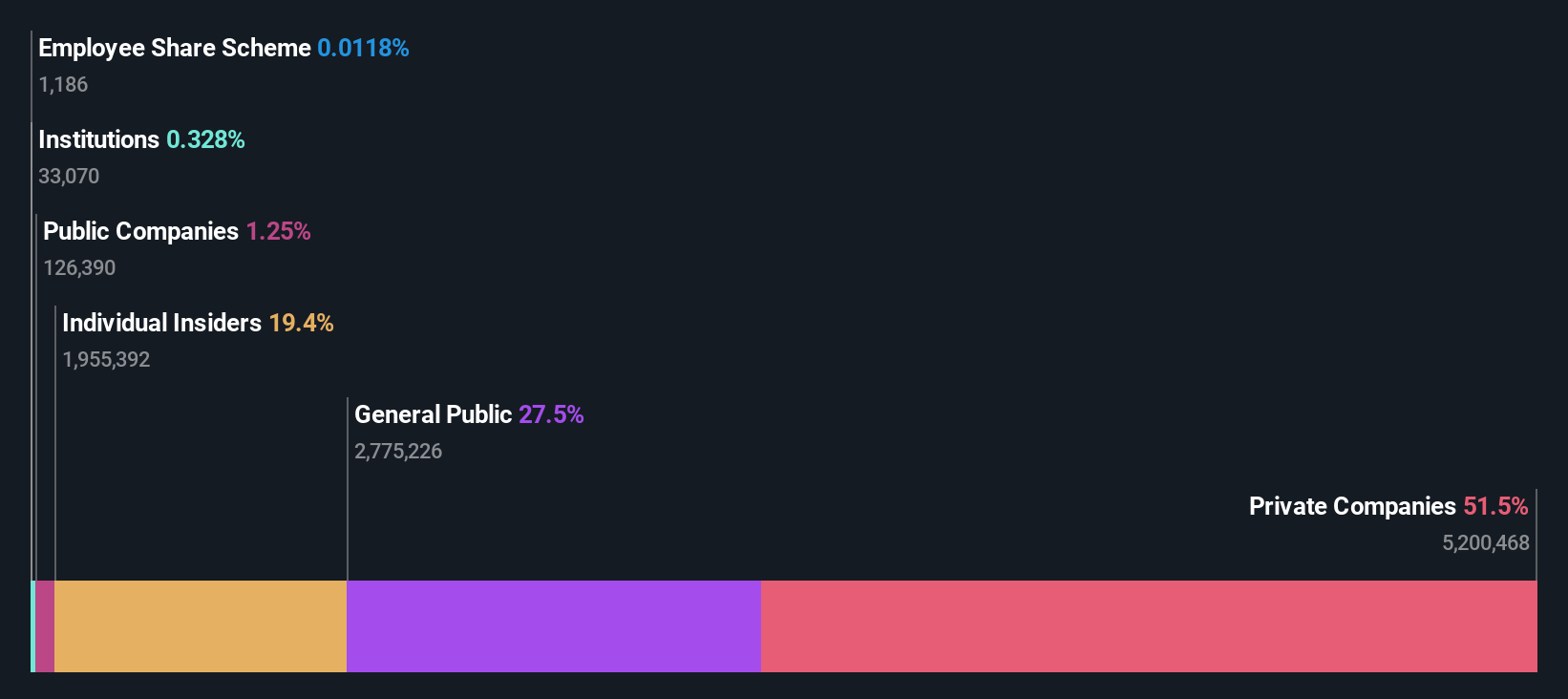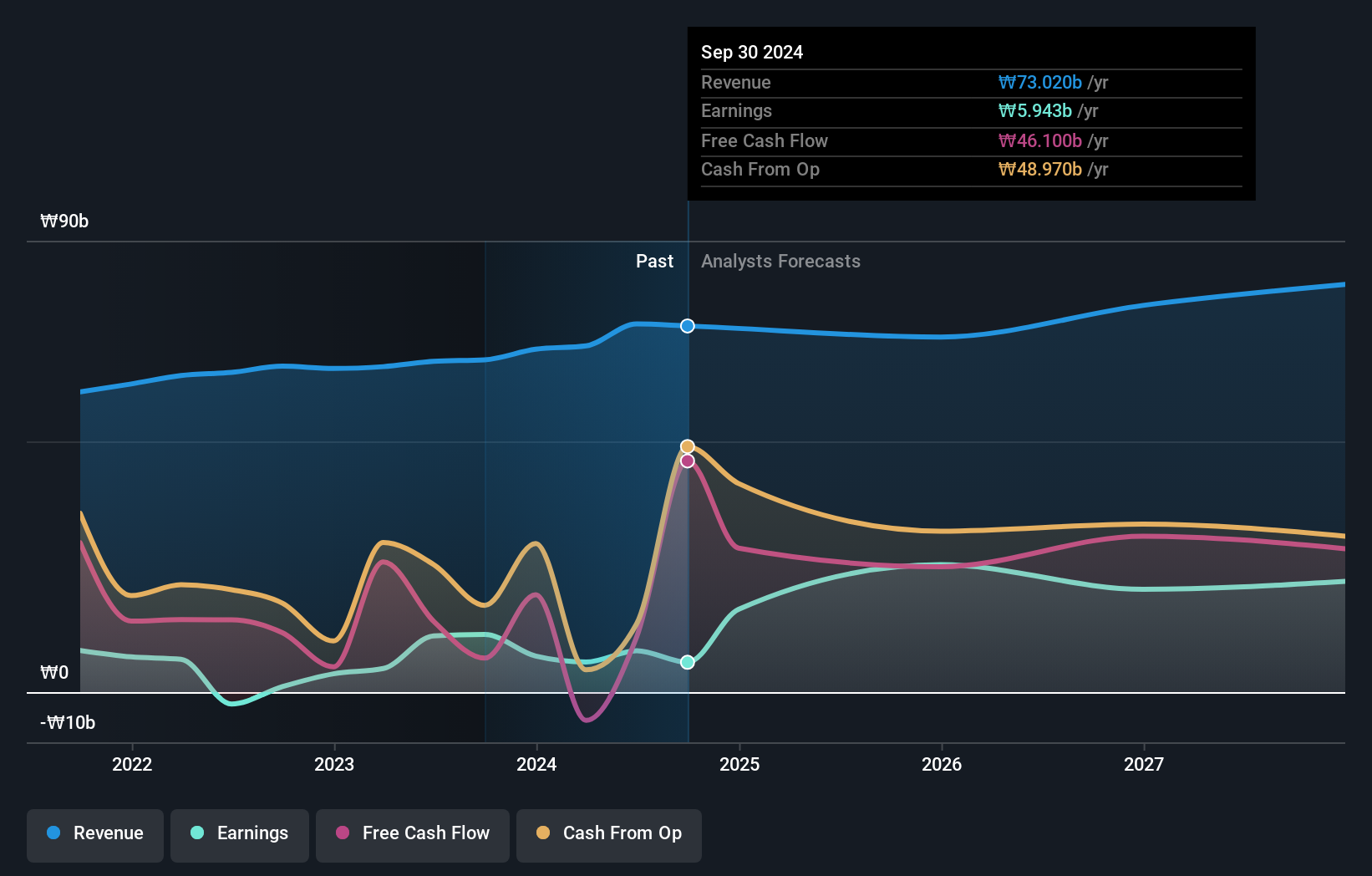- South Korea
- /
- Capital Markets
- /
- KOSDAQ:A294570
COOCON Corporation's (KOSDAQ:294570) last week's 11% decline must have disappointed private companies who have a significant stake
Key Insights
- COOCON's significant private companies ownership suggests that the key decisions are influenced by shareholders from the larger public
- The top 3 shareholders own 53% of the company
- Insider ownership in COOCON is 19%
A look at the shareholders of COOCON Corporation (KOSDAQ:294570) can tell us which group is most powerful. We can see that private companies own the lion's share in the company with 52% ownership. In other words, the group stands to gain the most (or lose the most) from their investment into the company.
And last week, private companies endured the biggest losses as the stock fell by 11%.
In the chart below, we zoom in on the different ownership groups of COOCON.
Check out our latest analysis for COOCON

What Does The Lack Of Institutional Ownership Tell Us About COOCON?
Small companies that are not very actively traded often lack institutional investors, but it's less common to see large companies without them.
There are multiple explanations for why institutions don't own a stock. The most common is that the company is too small relative to funds under management, so the institution does not bother to look closely at the company. Alternatively, there might be something about the company that has kept institutional investors away. COOCON's earnings and revenue track record (below) may not be compelling to institutional investors -- or they simply might not have looked at the business closely.

Hedge funds don't have many shares in COOCON. The company's largest shareholder is Webcash Vector Corporation, with ownership of 24%. For context, the second largest shareholder holds about 24% of the shares outstanding, followed by an ownership of 5.1% by the third-largest shareholder. Additionally, the company's CEO Jong Kim directly holds 3.8% of the total shares outstanding.
To make our study more interesting, we found that the top 3 shareholders have a majority ownership in the company, meaning that they are powerful enough to influence the decisions of the company.
Researching institutional ownership is a good way to gauge and filter a stock's expected performance. The same can be achieved by studying analyst sentiments. There is a little analyst coverage of the stock, but not much. So there is room for it to gain more coverage.
Insider Ownership Of COOCON
While the precise definition of an insider can be subjective, almost everyone considers board members to be insiders. Company management run the business, but the CEO will answer to the board, even if he or she is a member of it.
Insider ownership is positive when it signals leadership are thinking like the true owners of the company. However, high insider ownership can also give immense power to a small group within the company. This can be negative in some circumstances.
It seems insiders own a significant proportion of COOCON Corporation. Insiders have a ₩62b stake in this ₩318b business. We would say this shows alignment with shareholders, but it is worth noting that the company is still quite small; some insiders may have founded the business. You can click here to see if those insiders have been buying or selling.
General Public Ownership
The general public-- including retail investors -- own 27% stake in the company, and hence can't easily be ignored. While this size of ownership may not be enough to sway a policy decision in their favour, they can still make a collective impact on company policies.
Private Company Ownership
Our data indicates that Private Companies hold 52%, of the company's shares. Private companies may be related parties. Sometimes insiders have an interest in a public company through a holding in a private company, rather than in their own capacity as an individual. While it's hard to draw any broad stroke conclusions, it is worth noting as an area for further research.
Next Steps:
I find it very interesting to look at who exactly owns a company. But to truly gain insight, we need to consider other information, too. Case in point: We've spotted 4 warning signs for COOCON you should be aware of, and 1 of them is potentially serious.
Ultimately the future is most important. You can access this free report on analyst forecasts for the company.
NB: Figures in this article are calculated using data from the last twelve months, which refer to the 12-month period ending on the last date of the month the financial statement is dated. This may not be consistent with full year annual report figures.
New: AI Stock Screener & Alerts
Our new AI Stock Screener scans the market every day to uncover opportunities.
• Dividend Powerhouses (3%+ Yield)
• Undervalued Small Caps with Insider Buying
• High growth Tech and AI Companies
Or build your own from over 50 metrics.
Have feedback on this article? Concerned about the content? Get in touch with us directly. Alternatively, email editorial-team (at) simplywallst.com.
This article by Simply Wall St is general in nature. We provide commentary based on historical data and analyst forecasts only using an unbiased methodology and our articles are not intended to be financial advice. It does not constitute a recommendation to buy or sell any stock, and does not take account of your objectives, or your financial situation. We aim to bring you long-term focused analysis driven by fundamental data. Note that our analysis may not factor in the latest price-sensitive company announcements or qualitative material. Simply Wall St has no position in any stocks mentioned.
About KOSDAQ:A294570
COOCON
Together with its subsidiary, Webcash(Tianjin) Technical Development Co.,Ltd, operates as business data platform in Korea and China.
Flawless balance sheet with slight risk.
Market Insights
Community Narratives



